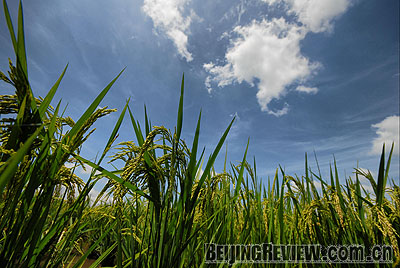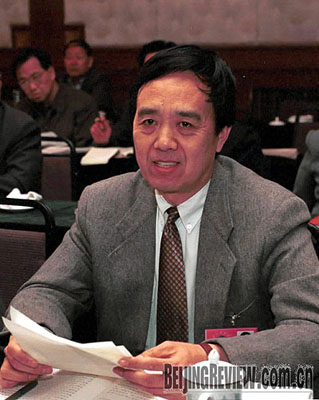|

THE HEAT IS ON: A rice paddy in Haikou, Hainan Province, south China, on May 30. Climate change could have a severe impact on agricultural production (WEI YAO)
A patch of wheat field 30 km from downtown Beijing is breathing the air of 2050. To simulate the atmosphere four decades from now, a white tube that is 2.5 cm in diameter is puffing high-density carbon dioxide from a 7-meter-high tank containing liquefied carbon dioxide.
"In the experiment field of the Chinese Academy of Agricultural Sciences (CAAS) in Changping District, Beijing, we are simulating the atmospheric carbon dioxide concentration in the year 2050, to test wheat growth in such an environment," said Lin Erda, a research fellow in the Institute of Environment and Sustainable Development of Agriculture of CAAS. Lin is a former director of the institute and a former director of the Laboratory for Agro-Environment and Climate Change, the Ministry of Agriculture. This 61-year-old veteran scientist has been helping crops to adapt to climate change, and trying to obtain scientific data to set up long-term effective disaster mitigation mechanisms.
Adaptability
"We should not only evaluate the adaptability to climate change through theoretical modeling, but should also test it through large-scale experiments," Lin stressed. He is conducting these experiments, including the Free Air CO2 Enrichment (FACE) experiment described above.
 SPARING NO EFFORT: Lin Erda elaborates his theory at a meeting
SPARING NO EFFORT: Lin Erda elaborates his theory at a meeting
Lin is a contributor to the Fourth Assessment Report of the Intergovernmental Panel on Climate Change (IPCC). In the report, he wrote that as the atmospheric concentration of carbon dioxide increases, the temperature will increase, which will change the pattern of precipitation and evaporation, and induce more frequent extreme climate events. This will affect crop growth and yield. Nevertheless, if we suppose that climate change does not happen, merely increasing the atmospheric concentration of carbon dioxide can boost crop growth through more active photosynthesis.
|
